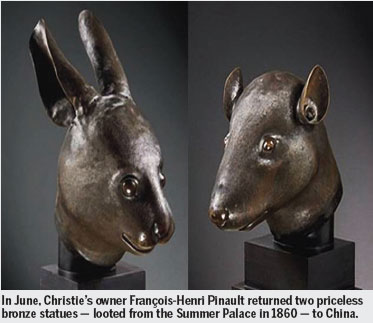Taxed over our heads
Updated: 2013-09-27 07:01
(HK Edition)
|
|||||||||
At the end of June, two bronze statues - one of a rat's head, the other a rabbit's head - were handed over to the National Museum in Beijing, by French tycoon Franois-Henri Pinault, CEO of the Kering Group (formerly PPR). The group manages a portfolio of luxury brands which includes the likes of Gucci and Boucheron. The two priceless treasures came home for the first time since being pillaged by Anglo-French invaders from a fountain at the Summer Palace during the Second Opium War in October 1860.
Pinault made good on an offer he made in April, when he accompanied French President Franois Hollande on a visit to China. That was the same month Christie's announced its entry into the mainland market. Coincidentally or not, the Kering Group, owned by the Pinault family, owns Christie's.
The venerable auction house found itself immersed in a toxic distillation that appeared capable of souring relations with China for years if not decades. Back in 2009, Christie's put the two priceless treasures up for auction, in Paris. The Chinese government lodged a protest. Chinese patriots stirred up a virtual whirlwind of acrimony online. The day of the auction came. Cai Mingchao, became the successful bidder, then refused to pay. He said the heritage artifact was stolen from China and should be returned.

The matter wasn't laid to rest there by any means. Soon after the auction, the State Administration of Cultural Heritage declared that the auction of the Chinese treasures by Christie's would have "serious effects" on Christie's development in China. Administrative departments overseeing cultural heritage issues were ordered at all levels to scrutinize "heritage items" that Christie's or its agents sought to import or to export.
Four year's later, China accepted the gift of the two bronze heads, opening a new era and leading to speculation about whether foreign auction houses could help the country reacquire more of its cultural heritage that had been spirited away, across the seas.
"What's critical to the return of overseas antiques is how much tax you need to pay," said a representative from Duo Yun Xuan, who refused to be quoted for the record. Duo Yun Xuan, China's sixth-biggest auction house was established in Shanghai in 1900. While tariff and other taxes for artworks are either low or nonexistent elsewhere, imported art is taxed on the mainland at a rate as high as 30 percent.
"The huge gap largely blocks the return of overseas cultural relics," said the man. "Who should pay the tax? It is almost a third of the sellers' income and higher than the commission fee auction houses charge. Given that, people would rather sell them in New York or London."
"Generally speaking, China wants its heritage pieces back," he said. "But we need to be practical about it and rewrite the law. The cross-border art market would flourish on a lower tax rate. I see no change anytime soon, however. The art market has nothing to do with the people's well-being, which is China's priority. The authorities are too busy to take care of matters like this now."

(HK Edition 09/27/2013 page6)